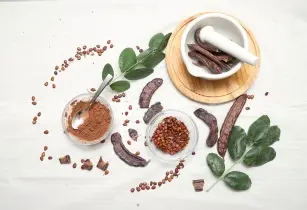AgriTech start-up CarobWay Ltd and Israel’s oldest environmental arm, the Jewish National Fund (JNF-KKL), have kicked off a research initiative for carob trees across Israel
The start-up aims to make the most of the nutritive value of the ancient carob plant (Ceratonia silique L), while paving the way to sustainable, advanced agriculture that guarantees fair-trade return to the growers. The result is a resilient food system that is helpful to all partners in the supply chain.
The start-up announced that it also sealed agreements with R&D farms and local farming communities in Israel to optimise carob cultivation to develop innovative carob-derived products.
The team is conducting broadscale screening of native carob species. This will enable the start-up to develop carob-based products that are in line with food industry needs. “We applied several analytical methods to attain a deeper understanding of various carob species and their unique characteristics specifically so that we can tailor our offerings more skillfully to our clients,” said Udi Alroy, co-founder and CEO of Carobway. “For example, some carob species grow fruit with higher sugar content, but with a naturally low glycemic index. These can serve the needs of food and beverage companies seeking viable sugar alternatives. Other trees bear more seeds and so are more suited to the locust bean gum industry,” he added.
Hulata runs a model grove dedicated to R&D, wherein local carob varieties and their cultivation methods from irrigation through to pollination technologies are regularly analysed by CarobWay staff. The orchard is fully automated and computerised, gathering all cultivation and meteorological data.
Carob Innovation: From orchard to table
The start-up also has made progress in creating innovative carob-centered food products in its private lab. “Carob is a highly nutritious and flavourful fruit, yet its true potential has yet to be realized. We are continually striving to bring the best of this super crop back to the table and to boost the carob value chain,” said Alroy.
As part of the tree survey, CarobWay developed an agri-app for aggregating pertinent field-level data of the various tree species and their traits. It includes such data as geographical location, tree yield, and seed volumes per pod. Fruit samples also are taken for laboratory analysis to gain a detailed map of their compositional makeup in order to assess nutritional value and functionality for specific supplement and food applications.
Tree research with JNF
CarobWay also sealed an agreement with the JNF-KKL for a nationwide survey of carob trees. The venture has conducted extensive field research to attain a full analysis of domestic trees and identify the most fruitful carob varieties, as well as optimum growing conditions.
The researchers have mapped the country using a Geographical Information Systems (GIS) data collection format in which trees are assigned to the closest meteorological station. This enables the researchers to accrue location-based data on such key parameters as rain volumes and humidity levels (both in high and low temperature zones) to identify the most ideal regions for growing carob trees.





